
Interview with Yuri's elder brother - Konstantin Krivonischenko
All rights belong to Komsomolskaya Pravda.
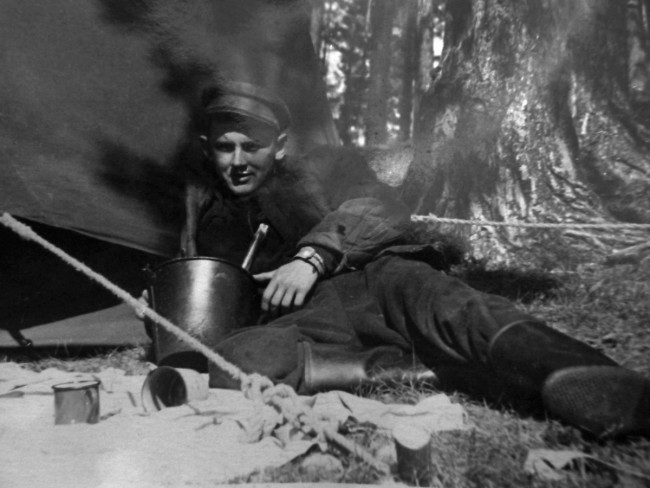
Yuri (Georgiy) Alekseevich Krivonischenko
Yuri Krivonischenko, along with Yuri Doroshenko, was found one and a half kilometers from the tent in the forest under the cedar. It is believed that both Yuri died the very first, since all the outer clothing was cut off by other hikers in order to warm themselves. According to the examination, Krivonischenko and Doroshenko died from hypothermia. But at the same time, chopped branches were found right under the cedar. Why both Yuri froze in a calm forest near a fire and in the presence of firewood is unclear.
Our correspondents met with Yuri's elder brother - Konstantin Krivonischenko.
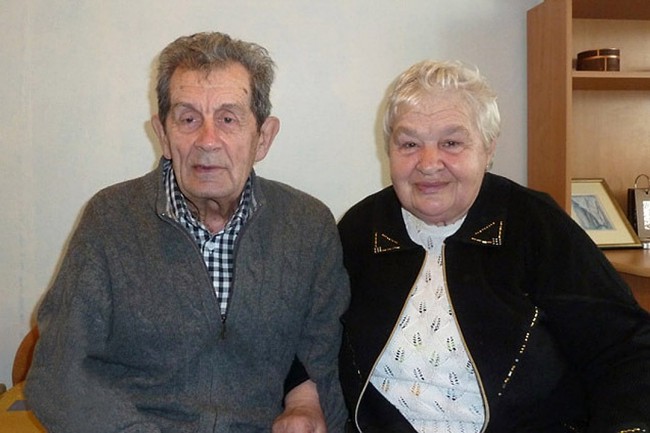
Konstantin Krivonischenko with wife Nina Panteleevna
To many researchers of this tragedy, Yuri Krivonischenko seems to be a rather mysterious person. It is known that he worked at the Mayak secret nuclear enterprise. It is believed that he was a KGB recruit. Yuri’s clothes turned out to be radioactive. For some reason, Yuri Krivonischenko, as well as another victim - Semyon Zolotaryov, was buried separately from other hikers in a prestigious and already closed city cemetery.
– 2 –
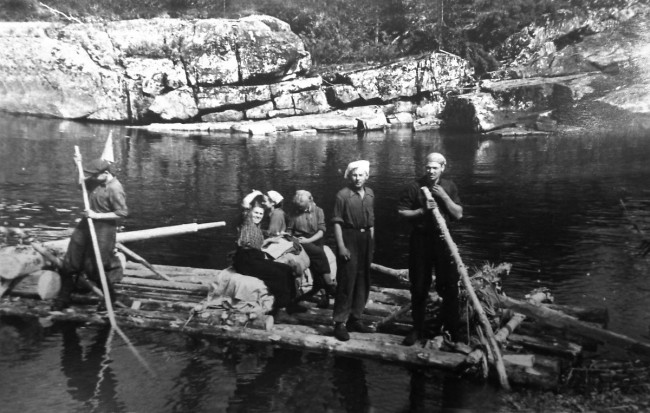
Camping photo: Yuri in the center on a raft in a scarf
Yuri’s brother, Konstantin Alekseevich, now lives in Kiev. This is what he told us.
- In 1959 I lived in the Urals. I worked at the Verkhniy Tagil state district power station as shift supervisor of the electric shop. There were three brothers in our family. I am born in 1931, Yuri - 1935, Igor - 1539. I was left alone, the oldest.
What to say about Yuri? He was a sociable and cheerful guy. He wrote very emotional poems. His favorite song was "I love you, life, and I hope this is mutual". And when he died, our mother found a piece of basalt, attached a silvered plate with an engraving on it with this line from Yuri’s favorite song. She put it on a shelf in memory of Yuri.
- How did you find out about the Yuri's death?
- I don’t remember how it happened. I know that they did not get in touch on time. They began to look for them. The bodies of the first five hikers were discovered. And Yuri was among them.
Krivonischenko's father saved by Stalin
- It is known that your father was the construction manager of the Beloyarsk State District Power Station. That is, the man is quite important, and he sought the truth about the death of Yuri, using his authority.
- Yes, he led a huge strategic construction site and was promoted to Major General. I can tell you a story about his authority. In 1949 father came under investigation. Echelons with cement were brought to the construction site before the scheduled plan. Since the warehouses had not yet been built, there was nowhere to unload the cement. A case was brought against my father in the prosecutor's office and he could be punished very harshly. But, as he later told us, they call him again to the prosecutor, and tell him that the case is closed, to continue work. My father out of the corner of his eye saw a telegram on the prosecutor's desk saying: “Do not touch Krivonischenko. Joseph Stalin". That's it about authority. Therefore, father managed to get Yuri to be buried where the parents decided. When father returned from the morgue with identification, he was simply silent. I began to ask him. Have you seen Yuri? He answered, yes, he saw him. And he didn't uttered a word after this. Before the funeral, Yuri was put in a closed zinc coffin. He was not brought inside the house; they laid him in the yard. Then they put the coffin in the church at the cemetery. There was no service. It was not allowed back then. Then mom said - leave me alone. Everyone left the church. She was there for about 10 minutes, probably crying. Then they buried him and that's all...
- And after that, did you father eaver talked about Yuri in the morgue? Was his color unusual?
- He did not say anything. He didn’t want to upset us. But the members of the search groups talked at the wake that the corpses were all black.
- But, probably, years later, this tragedy was remembered in the family, and your father said something about the reason hikers died?
- No, never. All we knew was that the tent was torn with a knife, and they came out through these holes. It was only later that conversations began that there could be some kind of military test. They also said that it was a rocket that flew to Novaya Zemlya from Kazakhstan, but fell.
- Do you think that if your father never talked, and did not make assumptions about the death of Yuri, then perhaps he knew the whole truth? Only it was such a truth that he could not divulge according to the harsh rules of the time?
- Everything is possible. Perhaps it was warned. But I don't know. Even when dad and I were gathering at the table, there was no talk about this topic. If I asked my father, he avoided responding. He died, dead, and that's it, an accident. If father knew something, he didn't have time to say it. He died suddenly in 1970. He was 63 years old.
– 3 –
What did Yuri's father know from eyewitnesses
In this regard, it is interesting to recall Krivonischenko's father testimony from the case files. We give it completely with all grammar errors.
Krivonischenko witness testimony
Sheet 273
Protocol
witness testimony
On April 14, 1959, the prosecutor criminologist of Sverdlovsk region Romanov interrogated as a witness in District Prosecution Office, in compliance with Article 162-168 of the Code of Criminal Procedure of the RSFSR
- Surname, name and middle name: Krivonischenko Aleksey Konstantinovich
- Year of birth 1907
- Place of birth: city of Dnepropetrovsk, Ukraine
- Nationality: Ukrainian
- Political affiliation: member of the CPSU since 1947
- Education (which school graduated and when): Higher education
- Occupation: a) currently (place of work and position): the head of the management of "Uralenergostroyekhanizatsiya"
b) at the moment of the events: the same - Criminal record: no
- Permanent residence (exact address and telephone number): Sverdlovsk, 29 Moscow St, аpt 27, ph D-1-96-30, work ph D-1-21-36
- Passport:
- Relation to the accused: -
Warned on the responsibility for the first part of Art. 92 of the Criminal Code of the RSFSR for refusing to testify and under Art. 95 Criminal Code of the RSFSR for giving knowingly false testimony is forewarned. Krivonischenko (signature)
back
Witness testified: After the funeral of my son on March 9, 1959, I had students over at the apartment, participants in the search for the nine hikers. Among them were those hikers who at the end of January and the beginning of February were on an expedition in the north, a little bit to the south of Mount Otorten. There were apparently at least two such groups, at least the participants of the two groups said that they had seen the light phenomenon that struck them on February 1 north of the location of these groups: the extremely bright glow of some kind of rocket or projectile. The glow was so strong, that some of the hikers that were already inside the tent and getting ready to go to sleep, were alarmed by this glow, went out of the tent and observed this phenomenon. After a while they heard a sound like a strong thunder from far away. I don't know the names of those who said that, because I have never seen them before and I don’t know them, but obviously the students who saw and heard this light and sound phenomenon can be tracked, as there were several people, and it was not difficult to determine which groups were in the North at that time. The students said that they had observed a similar phenomenon twice: on the first and the seventh of February 1959.
The students said that near the fire under the cedar were found belongings that were not on the deceased - my son and Doroshenko, at the same time, they didn't have shoes but there were socks laying around. We can assume that there were more people at the cedar tree than the two found there dead. The rest must have gone away when two
Krivonischenko (signature)
Sheet 274
were already dead, or if they were still alive and left at the campfire like a temporary base - then the abandoned did not see the clothes, since when freezing they would have probably put on everything that could get their hands on.
The students said that the fire at the cedar didn't go off due to lack of wood, but because nobody maintained it. This, too, obviously could be either because people who were at the fire did not see what to do, or because they were already blind or dead (blinded) mistake signature. They say that a few meters from the fire there were dry branches fallen from a tree that were not used. In the presence of a fire, it was not possible not to see something that could be easily used, so being blind seems like possible explanation. Both hikers found at the campfire gradually lost sight (but very quickly) and although they could maintain the fire wile the wood lasted - they could not do it after they couldn't see what to do. They froze after they were already dead. This is only a guess of mine.
Krivonischenko (signature)
Interrogated (signature)
– 4 –
Shortly before his death, Yuri resigned
To clarify. The Mayak disaster occurred on September 29, 1957. And Yuri, for sure, came under exposure there. His relation with the company soon went south. The family archive contains Yuri's letter of resignation dated August 15, 1958.
"Please provide me with payment and accept my resignation at my own request from the company PO Box 404/10 due to complete unwillingness to work in this system".
The resolution of the authorities on the letter is: "We can not find a reason for dismissal. It is necessary to fulfill the order of the head of the enterprise and begin work on the site "Ozero".
But Yuri still quit. He took a break and went to Otorten. It is possible that Krivonischenko went on the expedition in the same clothes in which he had been at the enterprise. This means that the radioactive elements found on his sweater and pants (only a sweater - ed. note) could be picked up while working on the rehabilitation site "Ozero".
- Other researchers say that your father, in response to a request to higher authorities, received a paper with the resolution "guilty party is punished"?
- I did not see such paper and did not hear anything about it.
- What do you think happened there?
- Most likely the tests were unsuccessful. In those days, there were rumors. Somewhere near this pass was a military unit. And then in the middle of the night suddenly they saw some kind of glow in the sky. The soldiers jumped out of the barracks. And allegedly some soldiers went to a psychiatric hospital. This is what people said.
- And what happened after 1959 in your family?
- Father was appointed construction manager of the Beloyarsk nuclear power plant in the Urals. He built it. And when the installation of the nuclear equipment began, he was transferred to Pavlodar. In the early 60s, he asked to be sent to Ukraine. And he was returned to his homeland.
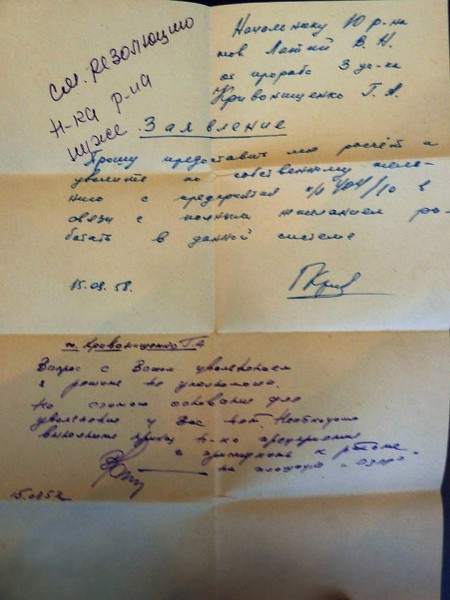
Yuri Krivonischenko letter of resignation
This video is not part of Komsomolskaya Pravda article.
There are photos of Yuri Krivonischenko on 6:28 and 6:58
– 5 –
Yuri’s mom didn’t part with her son’s belongings
- What did your mother say about the tragedy?
- She never talked about this either.
- As for mother, - Nina Panteleevna, the wife of Konstantin Alekseevich, entered into the conversation, - she always kept under her bed a suitcase with Yuri’s belongings - a sweatshirt, mittens and a hat, from his last trip. A large portrait of Yuri hung in the room. On the day of his death, mother sat in front of his portrait and cried silently. I have to admit that we were afraid of this suitcase, fearing that the items inside could be radioactive. We had a child. But mother lived with this suitcase until 83 years of age and nothing. When she died we buried the suitcase.
- Why did you decide that there are radioactive items?
- At the moment I can’t even imagine why, but for some reason back in the time there were such fears.
- When Yuri’s things were found on the pass, it was on his pants and on his sweater that traces of radioactivity were discovered.
- After graduating from UPI, - Konstantin Alekseevich explained, - in the early summer of 1957, Yuri got a job at the now infamous Mayak plant. I don’t know exactly what my brother was doing there, he said that he had soldiers under his command. And soon at the enterprise there was an explosion of a storage. There was a fairly large emission of radiation. This is a known fact. It is quite possible that he brought this radiation on clothes from the enterprise. After all, if he had soldiers under his command, then he probably participated in the liquidation of the consequences of the explosion. After that, he quit, got transferred somewhere and went on vacation. He did not return from this vacation.
We thank Konstantin Alekseevich and Nina Panteleevna for the warm welcome and for sharing these memories.
We took some of Yuri's poems from the family archive. They may seem imperfect to someone, but they tell us a lot about the character of this person. Let Yuri rest in peace, as well as his comrades in this tragic expedition.
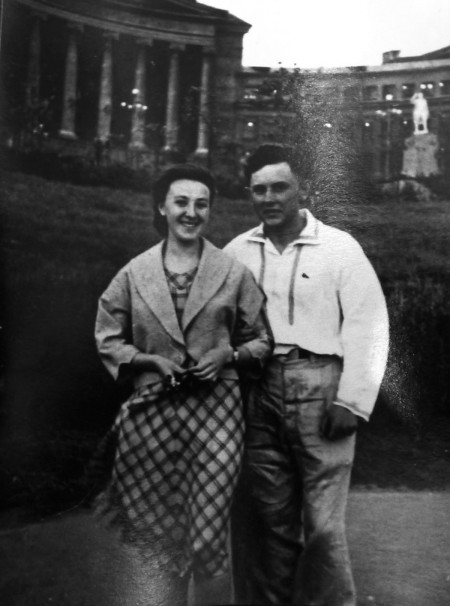
Yuri Krivonischenko with a friend. Perhaps it was to her that he dedicated his poems.
– 6 –
Skis in the corner, backpack on the closet,
Mandolin hanging on the wall.
Photo Album. Letters from friends,
Hiking treks - only in dreams…
Abandoned by fate to devil's horns:
There is no talk of mountains here,
Everyone calls me "fanatic"
They shed "crocodile tears".
And laugh, dipping noses in furs,
In life you will never know,
A snowstorm in the mountains,
How the wind plays the taiga.
You will never know grander,
When resting at the top,
And hundreds kilometers along
The green sea of the forests.
You will never see how rocks fall down,
How does the "Sayan vains" grow,
You have never seen the horns of a red deer
And roaring down stream from a clif.
You meet both winter and summer
Behind the double frame of the window,
And don't know the "power"
of sleeping by the fire in winter.
What do you boast about laughing at me?
With ignorance of your vast country?
Going to London, Paris, New York
To dance rock and roll, eat a couple of lobster
To buy fancy pants!
I feel sorry for you!
Y. Krivonischenko.
Campfire
I look at the burning fire.
Pink glowing flames won't last.
Comrades asleep, the day was dire.
Why can't you be with us?
Where on the world are you now
With a backpack and an ice axe,
What road are you dealt now
Always exploring the fate?
Maybe you’re making your way through the taiga
Knee-deep in the swamp waters,
Or wander under the ruthless sun
Somewhere in the Kazakhstan steppe?
Maybe you are in the snow of the Arctic,
And the blizzard sweeps your track?
Maybe this early morning
You meet the dawn in the Pamirs?
Covered with road dust
Hundreds of miles away from home,
Maybe your night is starless
And you don't think about me?
And you don’t know how often at nights
I move closer to the fire
And remembering you with longing,
I sing this sad song...
I look at the burning fire.
Pink glowing flames won't last.
Comrades asleep, the day was dire.
Why can't you be with us?
Y. Krivonischenko
Yuri Krivonischenko has beautiful sense of rhythm and rhyme that I haven't taken the time to match, translated word for word, except the strophe in italic, that repeats at the beginning and at the end of the Campfire poem.
You can discuss this article in the forum.








